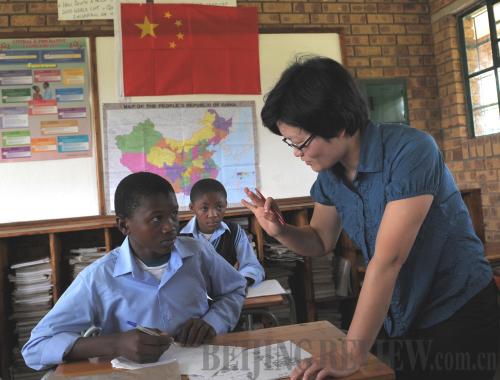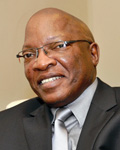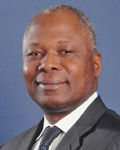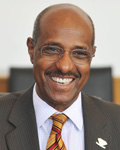|
 |
|
A WAY WITH WORDS: Shao Dan, a teacher from China, teaches Chinese at a high school near Pretoria on February 25 (LI QIHUA) |
As African countries gear up to celebrate the 50th anniversary of the founding of the Organization of African Unity (OAU), the predecessor of the African Union (AU), Beijing Review spoke with several African ambassadors to China to solicit their opinions on the AU's role and future development. Excerpts follow:
Beijing Review: In your view, what role has the AU played in strengthening African unity over the past half century?

South African Ambassador Bheki Langa: The 50th anniversary comes at a moment when Africa is on the rise, as reflected by the fact that Africa is home to six of the 10 fastest-growing economies in the world. This was achieved because of the deep economic and political reforms that have taken place on the continent, spearheaded by the transformed AU.
As the coordinating body for the continent's political and economic programs, the OAU was instrumental in fostering cohesion, unity and common purpose in otherwise disparate countries with different but common challenges related to underdevelopment, poverty and lack of economic infrastructure.
The OAU's transformation into the AU in 2002 has provided the needed impetus toward institutionalizing the necessary reforms to move the continent from what The Economist called the "Dark Continent" on one of its covers, to what it today recognizes as a "Rising Continent."
The common continental objective is to define a trajectory for Africa to extricate itself from the status of development laggard. Indeed, the start of the new millennium has seen the reawakening of discourse and action on African development and renewal.

Cameroonian Ambassador Martin Mpana: The role played then by the OAU and now by the AU has been instrumental in harmonizing African policies in various fields. The AU was strengthened through various decisions and actions: total liberation of Africa from colonialism and all forms of discrimination, including apartheid; promoting unity and solidarity amongst African states; coordinating and intensifying cooperation and efforts to ensure better living conditions for the peoples of Africa; and defending the sovereignty, territorial integrity and independence of African states.
It's worth mentioning that the OAU/AU is the only African institution that brings together the continent's heads of state, so they can discuss common African issues and make decisions on Africa at the top level. Therefore, the AU plays a crucial role in terms of coordination.
Pan-Africanism and the African renaissance are the themes of the AU Golden Jubilee celebrations. Why are these two themes so important?

Ethiopian Ambassador Seyoum Mesfin: They are so important because the ideology of pan-Africanism is still a burning desire and the roots of this movement go beyond the days of the establishment of the OAU. It actually started in the movement of the African diaspora across the Atlantic in North America and the Caribbean islands. There were major movements for the political and human rights of the African diaspora led by leaders like Marcus Garvey, an African Jamaican.
When this was adopted by the founders and forefathers of the OAU in the 1960s, this pan-African ideology was meant to liberate black people from colonialism, slavery and injustice, and we see this pan-African ideology and spirit as more relevant today than ever because Africa is still not liberated from backwardness, and millions of Africans are still living in underdeveloped conditions.
Africa is a continent rich in culture. It may be backward in terms of development, but Africa is the cradle of humanity and also inspired many ancient and Middle Eastern civilizations that the Africans helped advance in trade, shipbuilding and many other areas. The renaissance of Africa is not only a dream about what Africa was in the past, but also looking to the opportunities that Africa can find in international economic, political, diplomatic and security arenas.
Cameroonian Ambassador Martin Mpana: Pan-Africanism and the African renaissance reflect the historical and contemporary roots of the continent.
Pan-Africanism refers to the vision of the founding fathers of the OAU/AU, who aimed at fighting against colonialism, apartheid and all kinds of oppression and discrimination.
The African renaissance refers to the strong political will and the consensus reached at the 1999 OAU Summit in Sirte, Libya, on the need for Africa to embark on transformations toward stronger unity by reinforcing the role of regional economic communities. This coincided with the birth of the AU in a changing global order.
| 